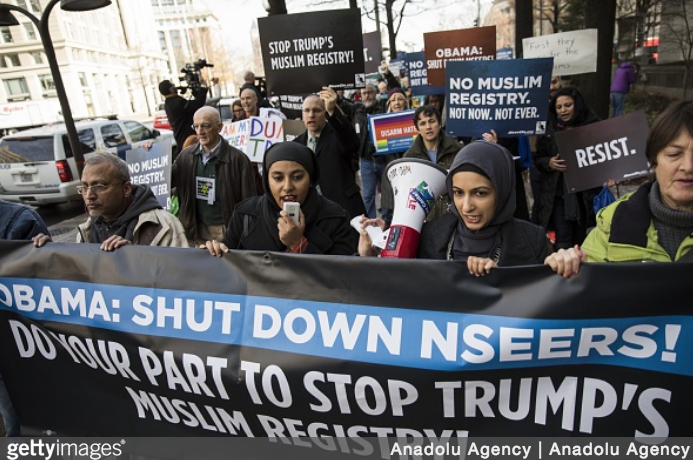The Obama administration Thursday rescinded the regulatory framework for a widely criticized post-9/11 travel registration system that has been dormant for five years after officials deemed it redundant and ineffective.
The decision by the Department of Homeland Security to effectively kill the program—the National Security Entry-Exit Registration System (NSEERS)—came after a wave of civil rights groups petitioned the administration to dismantle it. Critics considered the program, which was created after the Sept. 11, 2001 attacks, discriminatory toward Muslims, since it affected only those coming from 24 predominantly Muslim countries, plus North Korea.
The DHS’ notice states that NSEERS was ineffective in that it required personnel to manually register non-immigrant travelers, while more efficient, automated programs later adopted proved much more effective in tracking non-citizens entering the country. The DHS de-listed the 25 countries associated with the program in April 2011, but left its regulatory framework in place.
“The regulatory structure pertaining to NSEERS no longer provides a discernable public benefit as the program has been rendered obsolete,” the DHS said in its notice.
Related: Trump Team Considering Resurrecting Ineffective & Discredited Bush-Era Muslim Registry
The move by the Obama White House is its first direct response to President-elect Donald Trump’s hard-line immigration policies, which include proposals to ban Muslims from entering the United States and creating an NSEERS-like registration system.
Trump on Wednesday reportedly suggested he might go ahead with his proposal to ban Muslims from entering the United States following the terror attack on a Christmas market in Berlin, Germany.
Following Trump’s election, several immigrant advocacy and rights groups called on Obama to rescind the NSEERS regulatory framework, warning that if left untouched, Trump would be able to resurrect the program despite its deficiencies. Groups wrote letters, signed petitions and marched to the White House to express their dismay over the Obama administration’s failure to dismantle the program’s legal basis.
“The NSEERS program was all at once ineffective, expensive and discriminatory. It did not lead to a single known terrorist conviction, it has been discredited by the Department of Homeland Security’s own inspector general, as well as former DHS leaders in the George W. Bush administration,” said Shoba Sivaprasad Wadhia, director of the Center for Immigrants Rights Clinic at Penn State Law, who has studied the program for years.
“For the Trump supporters who care about cost, NSEERS was [a] failed experiment,” she added. “For the Trump supporter who cares about finding the next ‘dangerous person,’ singling out Muslim men is not the way to finding…the next terrorist or a substitute for actual intelligence gathering. For the Trump supporter that believes in the rule of law and the US Constitution, NSEERS was at the brink or in the middle of raising major questions of constitutional law, or at least, being in the bucket of lawful but awful.”
Joanne Lin, senior legislative council for the American Civil Liberties Union, in a statement hailed Thursday’s decision.
“NSEERS was a completely failed counter-terrorism tool and massive profiling program that didn’t yield a single terrorism conviction in nearly a decade,” she said. “The ACLU applauds the Obama administration for terminating NSEERS for good. With this action, the U.S. is on the right path to protect Muslim and Arab immigrants from discrimination.”
Related: NY AG to Obama: Dismantle Framework of ‘Discriminatory’ Registration Program
Operated by the DHS, the program, which was intended to add an additional layer of security at points of entry and exit throughout the country, failed to lead to one terror prosecution. The program was later found to be redundant, and the DHS’ Inspector General, in a 2012 report, cited terminating NSEERS as a way of better conserving resources.
NSEERS collected the identities of 80,000 men and teenage boys from the impacted nations, as it required them to register with customs officials as they entered the country. The government placed more than 13,000 men in removal proceedings for such violations as failing to timely re-register with local immigration offices.
NSEERS had a three-pronged approach: It collected information of non-immigrants from 25 countries entering the United States, required those registered to inform customers officials when leaving the country, and forced men already in the country to “check in” with their local immigration office.
Immigration advocates criticized the program from the start. Many of those who would’ve complied with immigration requirements could not because they were left in the dark about their responsibilities, advocates said.
In one case, a 19-year-old man in the United States on a student visa was placed in removal proceedings because a car accident caused him to postpone his visit to a local immigration office by a day.
The program created such confusion at times that department heads released memos to employees across the country to use “prosecutorial discretion” in light of legitimate excuses.
“The federal government relied principally on notices in the Federal Register to inform the public of registration requirements, and, like the majority of the American population, most individuals subject to NSEERS were not familiar with the Federal Register or the requirements contained therein,” researchers at the Center for Immigrants’ Rights at Penn State Law said in a 2012 report.
Related: In Trump Meeting, Rep. King Calls for Muslim Surveillance Designed After NYPD Program
One of NSEERS’ architects, Kansas Secretary of State Kris Kobach, reportedly serves on Trump’s transition team, and in a meeting with the president-elect, was photographed holding documents suggesting the government would restart the program.
Kobach’s proposal would seem to even further single out Muslims by adding “extreme vetting questions for high-risk aliens: question them regarding support for Sharia law, jihad, equality of men and women, the United States Constitution,” according to notes that were photographed.
Without any specific proposals it’s difficult to discern how Thursday’s decision by the Obama administration would impact Trump’s policies going forward, Wadhia of Penn State Law, said, adding that if the president-elect wanted to re-implement the program he’d “have to start from scratch.”
Any ban “singularly focused on faith” would raise serious constitutional questions, Wadhia said.
If the incoming administration does go forward and implements a similar program, it could possibly face prolonged legal challenges, she suggested.
“I think his rhetoric during the election could lead to a wider foundation for bringing legal challenges, especially surrounding animus and any intentional discrimination,” Wadhia said.































